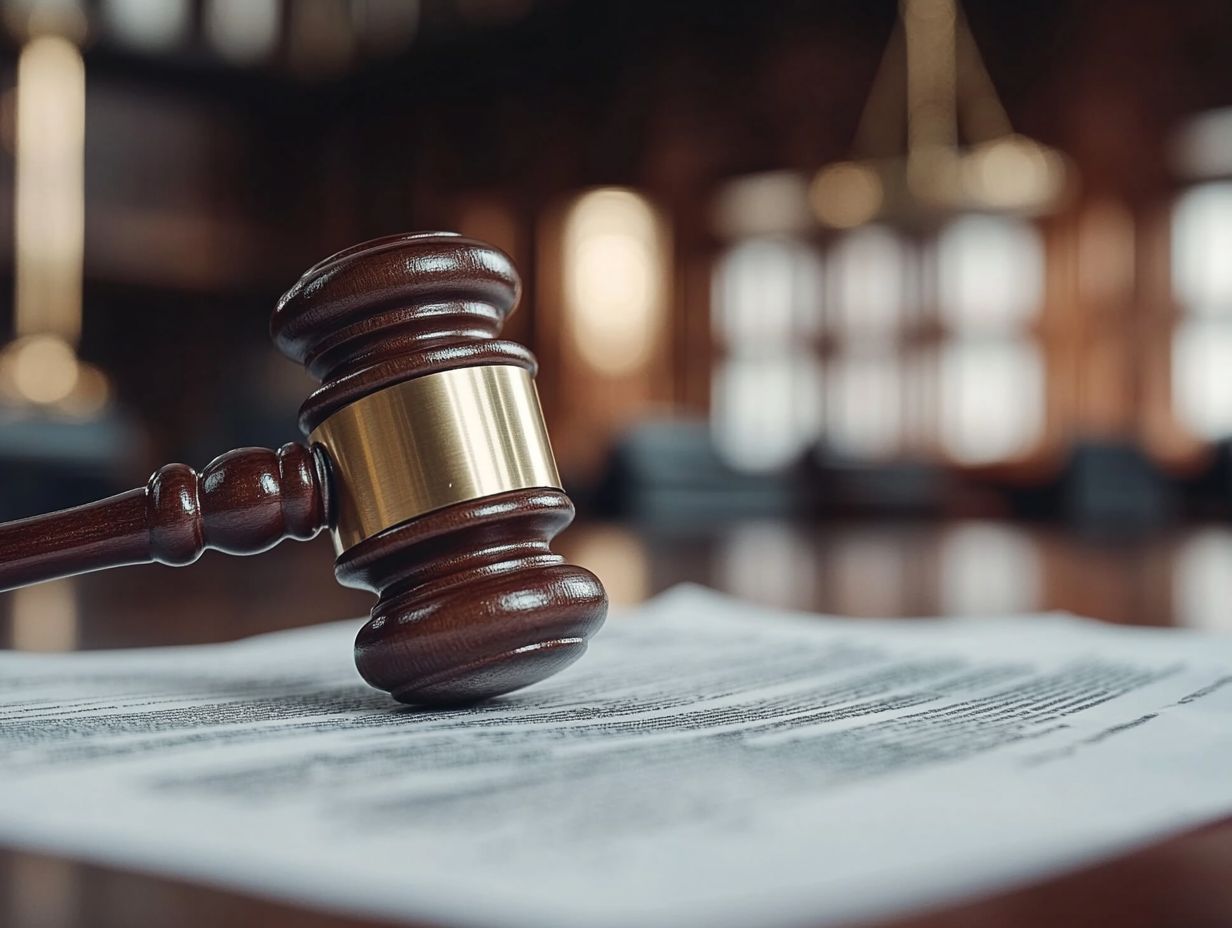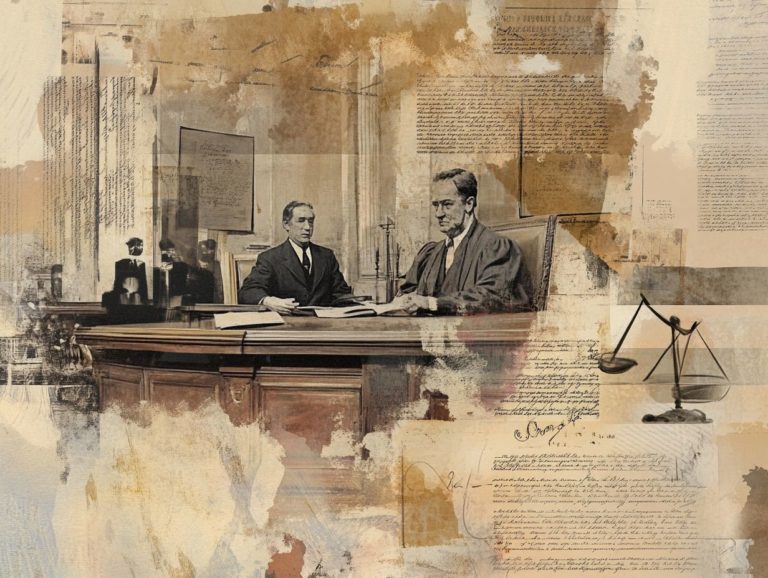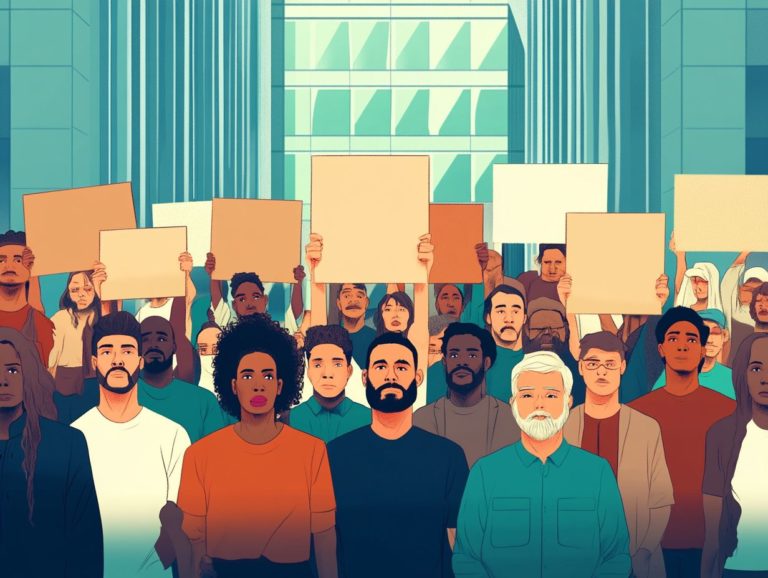Understanding Rights of the Accused in Appeals
Navigating the complexities of the appeals process can feel overwhelming, particularly for those who have encountered the legal system.
This article distills the essentials of appeals, guiding you through what an appeal truly is while shedding light on the fundamental rights that safeguard the accused. It delves into common grounds for appeal, outlines the detailed steps involved, and discusses the potential outcomes that may arise.
Whether you’re seeking clarity on your own circumstances or simply wish to expand your understanding of the judicial process, this guide provides valuable insights at every turn.
Contents
Key Takeaways:
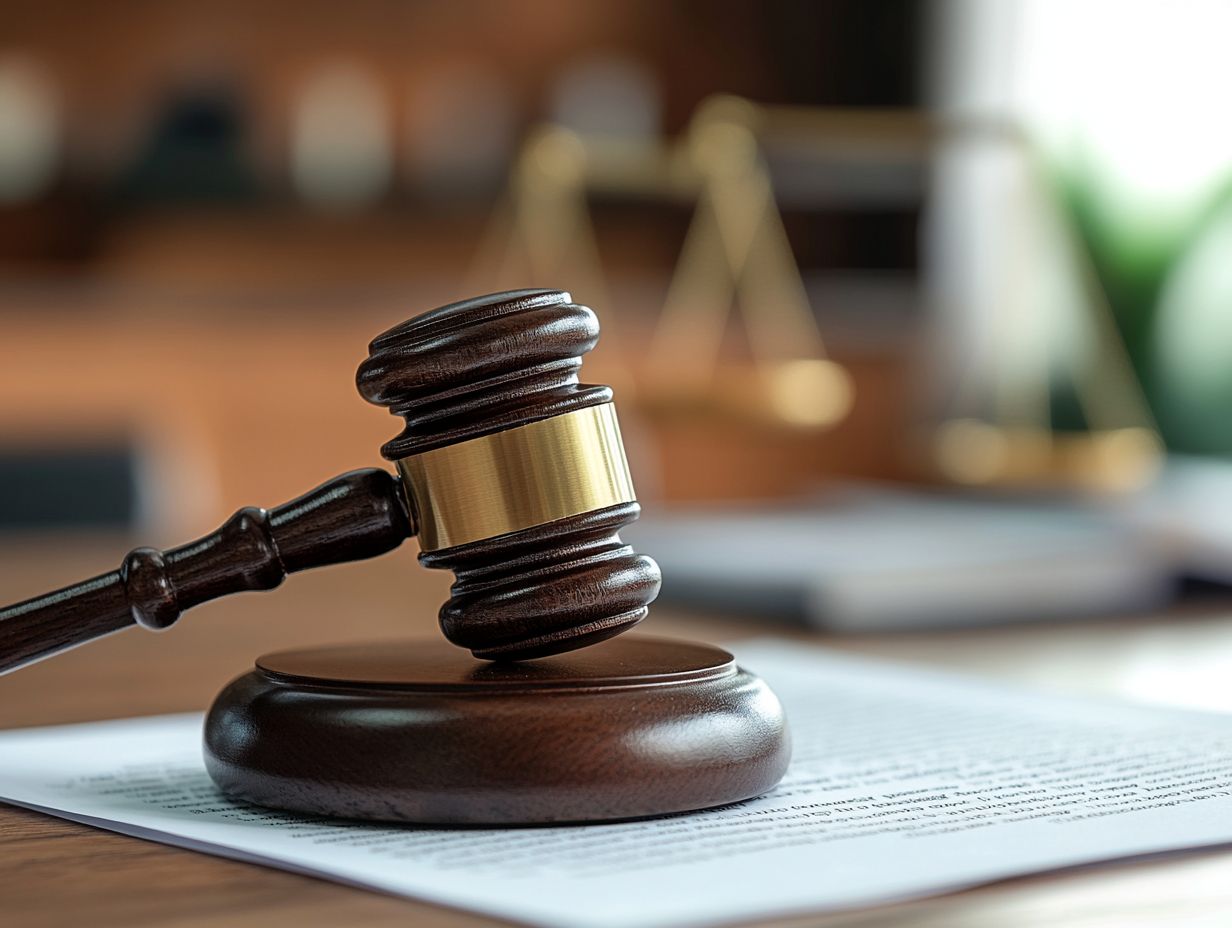
Knowing your rights during an appeal can change everything. The Constitution has your back, ensuring you get fair representation and a chance for justice. Potential grounds for filing an appeal include errors or wrongdoing by lawyers, jurors, or poor legal representation during the trial. The outcome could result in a reversal, remand, or affirmation of the conviction.
The Basics of Appeals
Understanding the criminal justice system is essential for anyone navigating this intricate landscape, especially in Pennsylvania.
While a criminal trial concludes with a verdict, the journey doesn t necessarily end there for defendants who seek to challenge potential legal errors made during the trial.
The appeal process opens the door to a review by appellate courts, providing a chance to address critical issues.
Hiring a skilled PA appeals attorney can greatly influence the outcome of an appeal, significantly enhancing your prospects of securing a new trial or achieving a favorable decision from the appellate court.
What is an Appeal?
An appeal is your legal pathway to seek a review of a trial court’s decision, typically based on claims of legal errors that may have swayed the case’s outcome.
This process acts as a crucial safeguard within the judicial system, giving you the power to challenge decisions that may have arisen from procedural missteps, misinterpretations of the law, or questions about the admissibility of evidence.
The foundation for pursuing an appeal lies in established statutes and rules of appellate procedure, which vary by jurisdiction.
To embark on this journey, you must file a notice of appeal a formal document declaring your intention to contest the trial court’s judgment.
Keep in mind that this document should be submitted within a specific timeframe, often within 30 days of the decision, to ensure a timely review by an appellate court that will evaluate the validity of the claims you’ve presented.
Rights of the Accused in an Appeal
The rights of the accused are crucial in the appeal process, as the United States Constitution ensures specific protections that must be maintained throughout all legal proceedings, including appeals, especially in criminal cases.
Constitutional Protections
Constitutional protections, particularly those enshrined in the Fifth Amendment, are essential for ensuring that you, as a criminal defendant, receive a fair trial and that your rights are honored during the appeal process.
These protections, especially the principles of due process and the prohibition against double jeopardy, serve as a robust foundation for judicial review in criminal cases. Due process guarantees that you have a fair chance to challenge your convictions, fostering transparency and justice within the judicial system.
The double jeopardy clause ensures that you won t face trial twice for the same offense, shielding you from the harsh realities of repeated legal repercussions.
With these constitutional safeguards in place, you can navigate the complexities of the legal system with a sense of assurance, confident that your fundamental rights are upheld throughout the appellate journey.
If you think your trial had errors, don t hesitate contact a legal expert today!
Right to Legal Representation
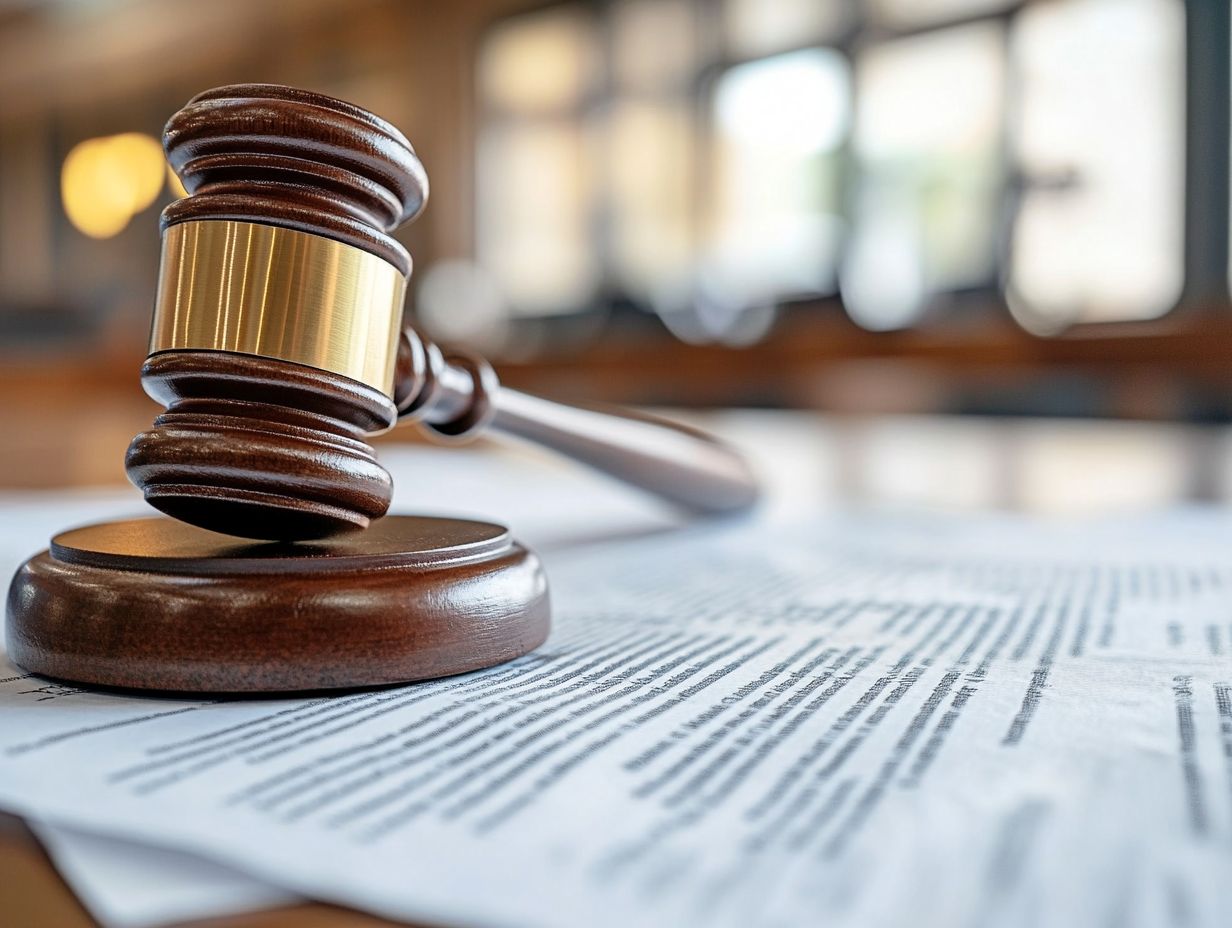
The right to legal representation stands as a cornerstone of the criminal justice system. It ensures that you have access to professional guidance throughout the appeal process.
In Pennsylvania, navigating the intricate landscape of legal procedures and paperwork can feel overwhelming, especially when you re appealing a criminal conviction. This is where a valuable appeals attorney becomes essential. They bring a wealth of expertise and insight into the complexities of state laws and procedural standards.
They meticulously analyze trial records, pinpointing potential legal errors that could pave the way for a successful overturning of a verdict. With a skilled criminal defense lawyer by your side, you ll be better equipped to articulate compelling arguments and present persuasive evidence to appellate courts. This ultimately enhances the chances of a favorable outcome.
Their specialized knowledge not only simplifies the process but also gives you the power to fully understand your rights and options during these challenging times.
Right to a Fair Trial
The right to a fair trial is a cornerstone of the court process, and its significance endures throughout the appeals process.
Appellate courts carefully review cases to check if the initial trial followed established legal standards. This careful scrutiny involves a thorough examination of jury instructions, which guide jurors in their decision-making, ensuring they grasp the applicable law.
The trial record serves as the essential foundation for these appellate reviews, enabling judges to identify any missteps or oversights that may have compromised the fairness of the trial. In this way, appellate courts uphold the integrity of the judicial system and protect the rights of individuals.
Grounds for Appeal
Grounds for appeal are critical reasons you may present to an appellate court to contest a trial court’s decision.
These can encompass a range of issues, from legal errors to serious concerns such as prosecutorial misconduct or sentencing mistakes.
Common Reasons for Filing an Appeal
Criminal defendants can file an appeal for various common reasons, such as claims of juror misconduct, sentencing errors, or the belief that their guilty verdict was improperly influenced.
These appeals often arise in situations where jurors might engage in inappropriate discussions outside the courtroom or form opinions based on media coverage. This can compromise the fairness of the trial.
For example, if a juror shares personal experiences that resonate with the case, it can introduce bias, leading to claims of juror misconduct. Erroneous jury instructions can mislead jurors in assessing evidence, ultimately affecting their decision-making process.
Understanding these nuances highlights the broader implications of fairness and justice within the legal system, where the integrity of a trial is of utmost importance.
The Appeals Process
The appeals process is a carefully structured journey through the judicial system that gives you the power to contest trial court decisions.
This journey ends with a thorough review of your case, ensuring that your concerns receive the attention they deserve.
Steps and Timelines
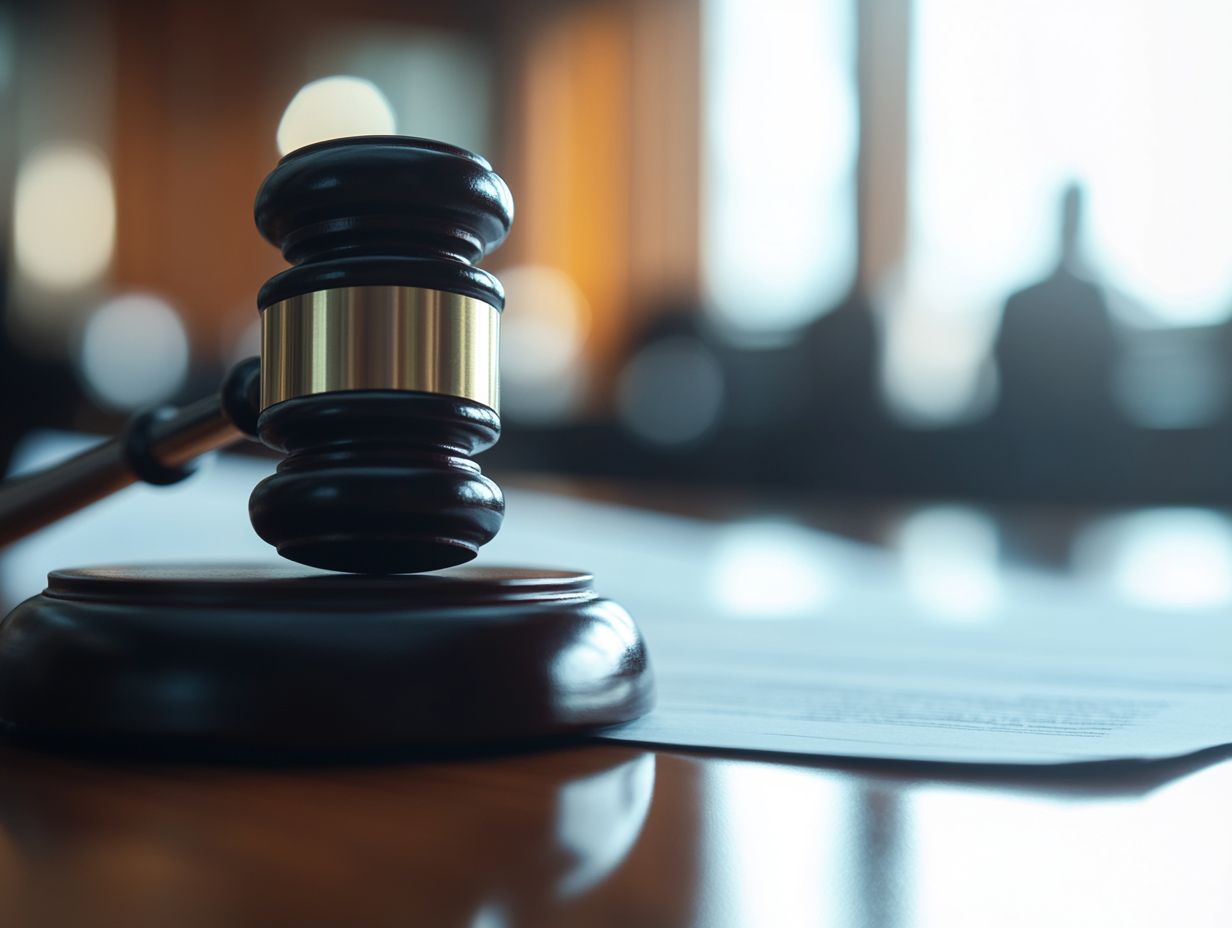
Understanding the steps and timelines involved in the appeal process is essential for you as a defendant seeking to navigate your appeals efficiently.
The appeals process typically kicks off with the filing of a notice of appeal. Don t miss your chance act quickly to file your notice of appeal! You must ensure this is completed within a specified timeframe following the verdict of your initial trial.
Once that’s done, you ll need to prepare the appellate brief, where you outline your arguments and highlight the legal errors you believe occurred during the original trial. This document, along with the trial record, must be submitted in accordance with strict procedural requirements.
Following that, the court will schedule oral arguments, allowing both sides to present their case. Grasping these critical steps can profoundly affect the outcome of your appeal. Your future may depend on this process!
Possible Outcomes of an Appeal
The potential outcomes of an appeal can profoundly influence a criminal defendant’s future. They may range from the reversal of a conviction to remanding the case for a new trial or affirming the original trial court’s decision.
Each outcome is important. It can significantly change your life.
Reversal, Remand, or Affirmation of Conviction
In the appeals process, the appellate court has several options: it can reverse the trial court’s decision, remand the case for a new trial, or affirm the conviction based on the evidence presented.
If the court reverses the decision, your charges could be completely dismissed, restoring your rights and freedom. If the court remands the case for a new trial, it indicates that serious procedural errors or issues affected the original trial, potentially changing the direction of your case.
Conversely, if the court affirms the conviction, it usually means that the judges found no substantial errors in the trial process and applied the law justly.
Several factors influence these decisions. These include the clarity of your legal arguments, the quality of the trial court’s record, and the relevance of precedential cases that reflect your circumstances.
Frequently Asked Questions
What are the rights of the accused in appeals?
The rights of the accused in appeals include:
- The right to a fair and impartial hearing.
- The right to legal representation.
- The right to challenge evidence and witnesses.
- The right to due process.
Can a person appeal a guilty verdict?
Yes, a person can appeal a guilty verdict if they believe that their rights were violated during the trial or if new evidence has been discovered that could prove their innocence.
Do the rights of the accused in appeals differ from those in the initial trial?
Some rights stay the same. Others may change during the appeal.
What is the purpose of an appeal?
The purpose of an appeal is to review the decision made in the initial trial. It determines if any errors affected the outcome of the case. Appeals can lead to a new trial or a modification of the original decision.
Are there time limits for filing an appeal?
Yes, there are usually strict time limits for filing an appeal. It is important to consult with your lawyer and adhere to these deadlines to ensure that your appeal is considered.
Can an appeal lead to a harsher sentence?
In some cases, an appeal can result in a harsher sentence if the higher court believes that the initial sentence was too lenient. It s crucial to carefully consider the potential risks and benefits of filing an appeal.
If you have questions about an appeal, consider consulting a lawyer for guidance.

